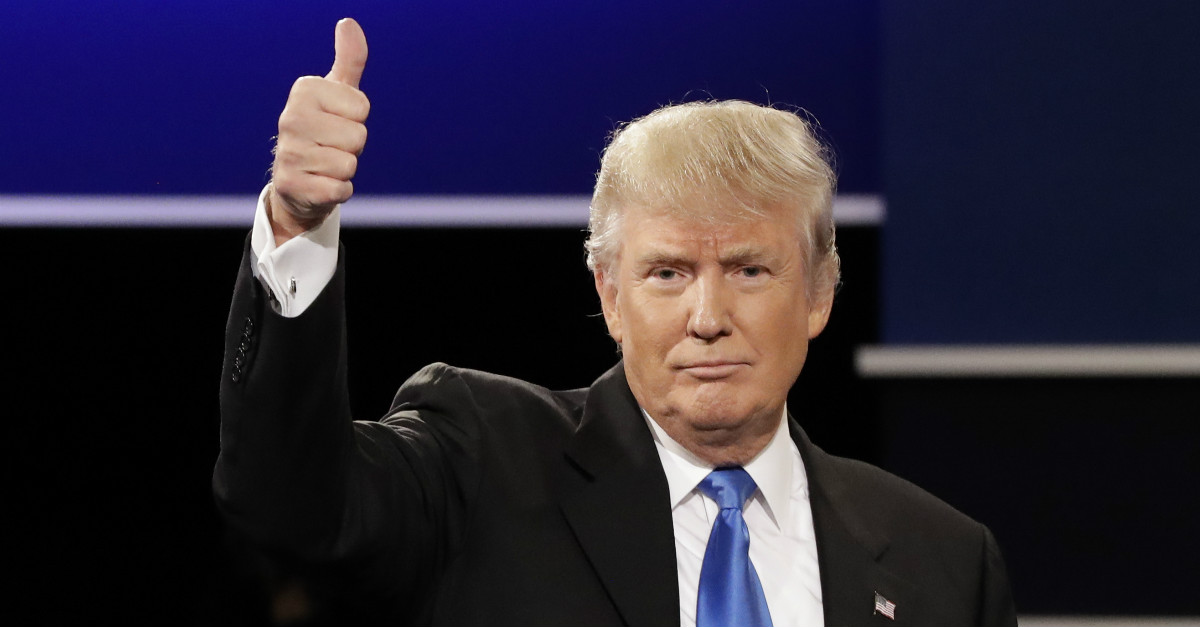I’m no fan of what might be called “big-business Republicanism.” The tendency by some in the GOP to serve as handmaidens for corporations creates all manner of problems, from anti-competitive regulations that prevent small companies from accessing markets to loopholes that make the tax code more labyrinthine.
Videos by Rare
“Big-business Republican” is the pejorative most likely to be hurled at Donald Trump following the release of his tax overhaul on Wednesday. Already, the talking heads are painting the plan as a get-rich-quick scheme for the Trump family with plenty of appended reminders that Trump has yet to release his own tax returns. GOP necromancers have reanimated “trickle-down economics,” the critics intone, and wealthy robber barons are cackling all the way to the Caymans.
That’s hogwash. Trump’s tax plan right now is skeletal and full judgment should be reserved until more meat is added to the bones, but so far it looks pretty good. If Trump can ram through legislation that’s premised on this outline, he’ll have racked up a real victory in his early presidency, one that will avail not just the rich but everyone else, too.
Trump’s tax reforms go something like this: slash the corporate tax rate from 35 percent to 15 percent; reduce the number of income tax brackets from seven to three and set their rates at 35 percent, 25 percent, and 10 percent respectively; eliminate all tax deductions except for mortgage interest and charitable giving; initiate a repatriation tax on all corporate dollars stored overseas; ax the death tax, alternative minimum tax, and 3.8 percent Obamacare investment tax.
Let’s tackle the last of those first. Critics are charging that because Trump paid taxes via the alternative minimum tax, that makes his wanting to eliminate it a conflict of interest. But killing the AMT isn’t some trickery cooked up by Trump’s accountants: it’s been a standard Republican priority for decades now.
RELATED: Tax reform will fail, too, if the GOP doesn’t learn the right lessons
The death tax or estate tax is also under scrutiny, with detractors sniffing that it only affects a handful of supremely wealthy Americans. While it’s true very few get knocked by the death tax, among them are farmers who are sometimes forced to sell acreage in order to afford it. Morally, the death tax is an abomination, whacking estate owners who have the gall to die and try to pass their property onto their children. This discourages savings and development, all for a mere $20 billion in revenue or roughly 0.5 percent of the federal budget.
Cutting the corporate tax is the most visible of Trump’s proposed reforms, and while it will certainly benefit big business, the current rates of 35 percent for corporations and 39.5 percent for pass-through corporations are the highest among industrialized nations and are untenable in a globally competitive world. The Tax Foundation finds that the corporate tax greatly hampers economic growth and that Trump’s proposed reduction—both standards and pass-throughs down to 15 percent—would increase long-run GDP by 4.1 percent.
That will boost not just Uncle Pennybags and his rapacious tycoon friends, but everyone who works for a business and does commerce with a corporation. Sorry, liberals: it might be an irritating cliché, but rising tides really can lift all boats. Though Ireland isn’t totally analogous to America, the fact that the Irish corporate tax rate is 12.5 percent and American businesses are lining up to headquarter in Dublin provides a guidepost.
RELATED: No, Democrats, paying taxes doesn’t make you patriotic
The vagueness of Trump’s plan leaves plenty of space for questions. How pummeling will that proposed repatriation tax be? How much paperwork will it save tax filers? How in the world is Trump going to eliminate tax loopholes when each of those is guarded by a lobbyist with ample access to Capitol Hill?
And most urgent of all: Is a latitudinous tax cut a wise idea with record debt and soon-to-be widening deficits? We all remember how the federal government’s books became unbalanced following George W. Bush’s tax cuts and massive spending, and the same pattern is portended now by the Tax Foundation: Trump’s similar campaign tax plan, they say, would reduce federal revenues by between $4.4 trillion and $5.9 trillion. Trump mercifully doesn’t plan to implement Paul Ryan’s border tax, so how will the money be recouped?
The answer is multifaceted but the biggest component is to actually cut spending, meaning cancel Trump’s improvident dump truck of money into the Pentagon and tell congressional appropriators to do their jobs. But don’t bury the president’s tax reform, which, unlike his health package, sets the right course for federal policy. Everyone interested in growing the economy should give this plan a chance.



